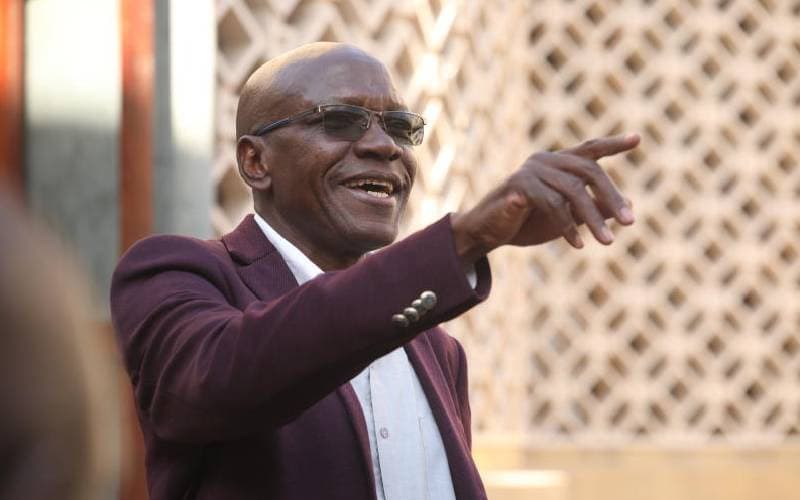We're loading the full news article for you. This includes the article content, images, author information, and related articles.
Kakamega Senator Boni Khalwale escalates his defiance of the ruling UDA party over the Malava by-election, transforming a local contest into a high-stakes test of party discipline and political dominance in Western Kenya.

Kakamega Senator Boni Khalwale has openly dared the leadership of the United Democratic Alliance (UDA) to remove him from his position as Senate Majority Whip. The challenge, delivered on Saturday, 25 October 2025, marks a dramatic escalation in a standoff over his support for an opposition candidate in the upcoming Malava Constituency by-election. This public act of defiance places the ruling party in a precarious position, forcing it to either discipline a senior official from a critical political region or risk appearing weak and unable to enforce party loyalty.
The political firestorm is centered on the Malava parliamentary by-election, scheduled for Thursday, 27 November 2025. The seat became vacant following the death of Member of Parliament Malulu Injendi in February 2025. In a move that has rankled the party hierarchy, Senator Khalwale has thrown his weight behind Seth Panyako of the Democratic Action Party–Kenya (DAP-K), an opposition outfit. UDA has officially fielded its own candidate, David Ndakwa, who was cleared by the Independent Electoral and Boundaries Commission (IEBC) on 9 October 2025.
Khalwale has justified his decision by stating the UDA nomination process was flawed. He claims his preferred candidate, Ryan Injendi, the son of the late MP, was overlooked for the party ticket, compelling him to support Panyako. “They are forcing me to take a stand against my community for a mere position. I cannot fight my house because of the positions,” Khalwale stated, framing his defiance as a matter of principle and loyalty to his constituents over party hierarchy.
The ruling party has not taken the senator's actions lightly. On 14 October 2025, the UDA Disciplinary Committee, chaired by Charles Njenga, issued a formal show-cause letter to Senator Khalwale. The notice gave him 14 days to explain why disciplinary action should not be taken against him for “gross misconduct” and “disloyalty.” The letter accuses Khalwale of offering “open, vocal, conspicuous, and substantial” support to a rival candidate, which contravenes the party's constitution. According to the notice, such actions demonstrate allegiance to another political party and are considered conduct unbecoming of a UDA member.
The party's constitution obligates members to popularize the party, observe discipline, and comply with its decisions. Potential sanctions under Articles 68 and 69 of the UDA Constitution range from suspension to expulsion from the party.
The standoff is more than a local dispute; it is a significant test of the Political Parties Act and the broader principles of party discipline in Kenya. The Act stipulates that a member who promotes the ideology, interests, or policies of another party can be deemed to have resigned from their sponsoring party. However, enforcing this provision has historically been challenging, with many politicians exploiting loopholes to support rival candidates without losing their seats.
Khalwale has further widened the rift by directly challenging President William Ruto's influence in the region. “President Ruto, let me tell you, in 2027, things are going to be difficult for you. That is when you will realize you need Khalwale here in Kakamega to succeed,” he declared at a rally. This confrontation turns the Malava by-election into a proxy battle for political supremacy in Western Kenya, a region crucial for the 2027 general election calculations. Senior Kenya Kwanza figures, including National Assembly Speaker Moses Wetang'ula, have campaigned for the UDA candidate, highlighting the ruling coalition's desire to maintain a united front. The outcome of this disciplinary process and the by-election will likely have lasting repercussions on the internal dynamics of UDA and the political landscape of the region.
Keep the conversation in one place—threads here stay linked to the story and in the forums.
Sign in to start a discussion
Start a conversation about this story and keep it linked here.
Other hot threads
E-sports and Gaming Community in Kenya
Active 9 months ago
The Role of Technology in Modern Agriculture (AgriTech)
Active 9 months ago
Popular Recreational Activities Across Counties
Active 9 months ago
Investing in Youth Sports Development Programs
Active 9 months ago
Key figures and persons of interest featured in this article